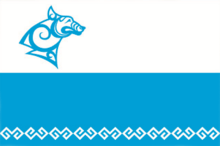Shors
 | |
| Regions with significant populations | |
|---|---|
| 12,888[1] | |
| 2 | |
| Languages | |
| Shor, Russian | |
| Religion | |
| Shamanism, Animism | |
| Related ethnic groups | |
| Khakas people, Sybyrs, Chulyms | |
Shors or Shorians (Shor шор-кижи) are a Turkic people in the Kemerovo Oblast in Russia. Their self designation is Шор, or Shor. They were also called Kuznetskie Tatars (кузнецкие татары), Kondoma Tatars (кондомские татары), Mras-Su Tatars (мрасские татары) in some of the documents of the 17th–18th centuries.
Most Shors live in the Tom basin along the Kondoma and Mras-Su Rivers. This region is historically called Mountainous Shoria. The Shors also live in Khakassia and Altai Republic. According to 2002 census, there were 13,975 Shors in Russia (12,601 in 1926, 16,042 in 1939, 14,938 in 1959, 15,950 in 1970, 15,182 in 1979 and 15,745 in 1989). The Shors speak their own Shor language.
In the late 17th century, the Shors converted shamanism to animism, but most later became members of the Russian Orthodox Church but continued to follow shamanism and animism as a part of their culture.
The Shors as a people formed as a result of a long process of intermixing between the Turkic, Ugric, Samoyedic and Ket-speaking tribes. Their culture and origins are similar to those of the northern Altay people and some of the ethnic groups of the Khakas.
The Shors were mainly engaged in hunting, fishing, some primitive farming, and pine nut picking. Blacksmithing and iron ore mining and melting were also important (hence, the name "Blacksmithing Tatars"). The lifestyle of the Shors changed significantly following the October Revolution of 1917. Most became skillful farmers, cattle-breeders, or industrial workers.
Environmental activist Alexander Arbachakov won a Whitley Award for his work preserving sustainable communities in Shor territory.[2]
References
- ↑ Russian Census 2010: Population by ethnicity (in Russian)
- ↑ Whitley Award winners Archived 2011-07-23 at the Wayback Machine.